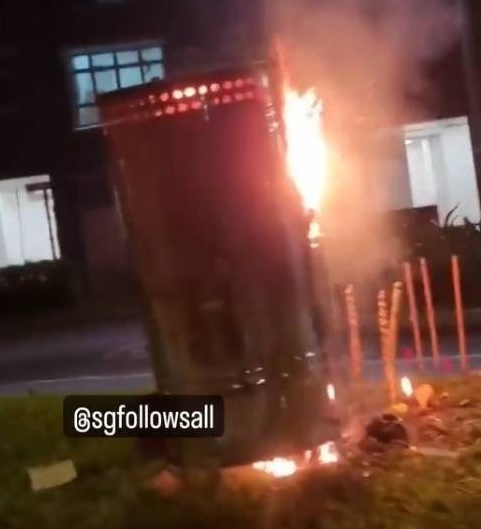Lest you didn’t know, yesterday (26 August) was the last day of the Hungry Ghost Month.
Usually, people burn incense paper and give offerings on the first, fifteenth and last day of the Hungry Ghost Month.
This means that from today onwards, you probably would see fewer people burning incense paper, but it turns out that people have become more considerate when they’re burning them.
Senior Minister of State for Sustainability and the Environment: Fewer Complaints about Incense Paper Burning & Littering During This Year’s Hungry Ghost Month
With this year being the first year when the COVID-19 measures are drastically eased after two years, you’d have thought that we’d be seeing more people burning incense paper, and therefore more complaints about inconsiderate burning.
Just yesterday, this video of a bin burning even went viral.

However, according to the Senior Minister of State for Sustainability and the Environment Dr Koh Poh Koon, this year’s Hungry Ghost Month saw fewer complaints over incense-paper burning, indicating that recent efforts by religious groups have had some success.
During his remarks at the Singapore Buddhist Federation’s (SBF) 37th council’s installation ceremony today (27 August), Dr Koh said that he had also noticed a dramatic decline in litter when walking about his Tampines district and that fewer locals had complained about it.
The reason behind this?
Alliance for Action (AfA) on Norms for Joss Paper Burning.
Yup, there’s such an alliance.
The AfA, launched in July, comprises 10 organisations, including SBF, the Taoist Federation, the Singapore Religious Goods Merchants Association and the Singapore Federation of Chinese Clan Associations.
Through the use of posters and videos, which have been put up in HDB buildings, supermarkets, and stores that sell prayer supplies, they have been educating the public about what to avoid doing during the Hungry Ghost Month.
Dr Koh said that religious guidance was essential for teaching individuals who perform the rituals to be more aware of their effects on the environment, as well as for assisting youth in understanding the cultural significance of these practices.
He said, “Older generations may be more used to the culture of incense burning and joss-paper burning, especially in the seventh lunar month.
“But the younger generation see some of these things as environmental pollution that does not sync with what they see as an urgent need (to protect) the earth and to be carbon neutral.”
Well, let’s now wait for one more year to see if there’ll be any further improvement.
Advertisements
You can know more about the Hungry Ghost Festival (the festival, not the month) here:
Read Also:
- Body of Man in Swimming Attire Found Floating at Sea in East Coast Park This Morning (27 Aug)
- People Have to Walk Under the Rain as Car Parked on Only Sheltered Walkway
- Former SBS Driver Who Sued SBS Had All His Claims Dismissed by the High Court
- Man Allegedly ‘Blacklisted’ from Renting Cars from Other Companies After His Daughter Left a Bad Review for 1 Company
- S’pore Influencer Claims Agency Wanted Her to Work for Free As She’s Malay
Featured Image: PixelRed / Shutterstock.com
Read Also:
- You Can Soon See “Northern Lights” in Gardens by the Bay & It’s Free
- Everything About the Eta Aquarids Meteor Shower That’ll Be in S’pore Sky in May
- S’porean Killed in Spain Had Bought Insurance Policy from Suspect
- Everything About the 15YO Who Lived in a Circuit Road Market Stall
- Walk-Ins for Some Traffic-Related Service in TP Be Discontinued & People Have Book Appointments Instead
- Certain Parts of Telok Blangah Hill Park to be Closed for 2 Years After Slope Failure
Advertisements

